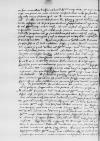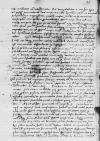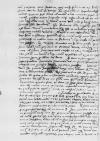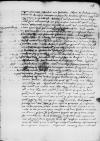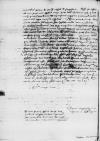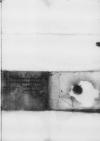Scripsi duodecima Decembris futurum, ut ⌊Π⌋ in carcerem retruderetur. ⌊Qui⌋ cum captus superiore die prius duceretur ante iudices, inde ducendus in carcerem, tot tantosque reperit defensores et vades, ut nullo pacto prohibere potuerimus, quominus sub eorum sponsione dimitteretur tantisper, dum disputationibus ultro citroque habitis decideretur, num in custodiam reducendus et torquendus sit. Ac mox, cum edidisset Chronologiam quandam suam, opus et parvi ingenii, et non magni laboris, utpote ex aliorum monimentis descriptum, eamque ⌊Q⌋ dedicasset, tantam nihilominus sibi apud illum et alios nonnullos denuo gratiam comparavit, ut opera eorum et progressum, et finem litis hactenus impedierit.
Quin et eundem ⌊Q⌋ occultissime induxit, ut et ipse ⌊ei⌋ per litteras a ⌊F⌋ . petere instituerit. Cur modo ⌊Π⌋ tantopere . istum urgeat, scripsi ante eius rei causas aliquot, quibus nunc accessit, quod frandulenter a ǂ in coadiutorem adoptatus etiamsi bonis et beneficiis prioribus privatus manserit, sperat se nihilominus post ǂ mortem in Σ ecclesia regnaturum. Sed adest hic perquam opportune E orator Nicolaus Miscovski, cuius opera facile efficiemus, confido, ut Q a petitione . desistens, potius E sententiam confirmandam litemque iam tandem terminandam curet. Nam ad hoc se idem orator promptum offert, quamvis ei a ⌊F⌋ nihil mandatum sit, et cum nudius tertius hac de re cum ⌊Q⌋ locutus fuisset, illud de . ab ipso intellexit mecumque communicavit. Scripsit praeterea ad me M prohibuisse ⌊F⌋ in utraque cancellaria ne . ad petitionem cardinalis Cortesii ⌊Π⌋ daretur, quod postea etiam Σ litterae prima Decembris datae mihique 27 praeteriti redditae confirmarunt. Itaque non dubito, quin novas istas fraudes et, ut ego existimo, ultimas ⌊Π⌋ divina ope facile etiam subvertemus totique causae desideratissimus finis iam vel hoc septimo tandem anno imponetur.
In negotio . cum mihi idem ⌊Π⌋ procuratorio nomine suis calumniis motestus esse pergeret, ego ab his me vindicaturus novam, secundum me latam, sententiam obtinui, cuius exemplum mitto, ut videant aemuli illi, quam verum sit . fuisse revocatum etc.
Libellos redditos esse et placuisse Reverendissimae Amplitudini Tuae gaudeo. Nec mihi quidem displicet ad eum modum negotium R, cum X transactum esse. Nam ex hac concordia + observantiorem Reverendissimae Amplitudini Tuae et aequiorem erga me futurum cum ceteris confratribus mihi persuadeo atque inde etiam factum, quod S ex . numeraverit Σ 20 marcas. Si illis coniunctus fuerit R praesensque apud ecclesiam residerit, insuper et V pro quo dudum supplicationem cessionis Ψ ad Reverendissimam Amplitudinem Tuam misi, id rem nostram non poterit non vehementer iuvare et nihil mihi fuerit iucundius, ne veterani illi perpetuo omnia pro sua libidine soli administrent nobisque simul magis innotescat, quid ab unoquoque eorum apud eeclesiam et in P fiat et dicatur.
R ad me superiore hebdomada ⌊Patavio⌋ scripsit sibi a O litteras redditas fuisse, quibus domum revocaretur. Quare, si quid vellem ad Reverendissima Amplitudine Tua litterarum dare, eas ad se illuc statim mitterem. Arbitror hoc Reverendissimae Amplitudinis Tuae hortatu contigisse laudoque. Ad eum igitur has litteras misi.
Quomodo res cum V successerit, etiam avidissime exspecto. Cum id . et + et S et Ferber amicos habemus et ǂ abest aeger, haud scio, quis contradixerit, quominus in mei canonicatus possessionem V admittatur me consentiente etiam ex sola supplicatione cessionis. De quo brevi spero laetas Reverendissimae Amplitudinis Tuae litteras me lecturum. ǂ si quid in quocumque mense humanitus acciderit, omnino agendum est, quod ante scripsi, maxime nunc propter istum adeo subdolum et perniciosissimum novum coadiutorem.
Si ⌊Langhannius⌋ formidaverit hoc subire nec ad id induci poterit. Supponatur alia, potens et idonea, persona. Ѧ admodum frequentes litteras ⌊Tridento⌋ ad Reverendissimam Amplitudinem Tuam se dedisse mihi scripsit, et cum illis iampridem rescriptum apostolicum ad accipiendam
suo nomine Lubecensis canonicatus possessionem misisse, ut quoniam mortui iam essent illi, quos ipse ⌊Lubecae⌋ habebat amicos, Reverendissima Amplitudo Tua per suos ibidem curaret hoc rescriptum exequi, quo tum eo exsecuto fieret istius canonicatus cessio ... vel Y, vel ⌊Lemanno⌋, verum quoniam hactenus nullum a Reverendissima Amplitudine Tua accepit responsum suspectam habere coepit domini ⌊Antonii Fugger⌋ fidem, ad quem eas litteras suas ⌊Augustam⌋ miserat. Ego vero illi respondi, ut deinceps litteras ad quendam L familiarem ⌊Patavium⌋ mitteret, qui eas fidelius atque certius curaturus esset, sicque faciet. Porro si tamen aliquan[do] rescriptum adhuc Reverendissimae Amplitudini Tuae reddetur, idque ut ⌊Lubecae⌋ exsequatur per amicos et notos aliquos ecclesiasticos viros effici poterit, conducet non mediocriter. Sin vero, dabitur a me hic opera, ut postquam procuratorium ad consentiendum ⌊Lemanni⌋ nomine in annuam pensionem et regressum, quale nuper sub V et Y nomine conscriptum cum iisdem proturatoribus Reverendissima Amplitudo Tua ad me misit, accepero, de quo prius iam semel atque iterum scripsi, resignatio istius canonicatus Lemanno fiat, in eamque necessaria diplomata expediantur et ad Reverendissimam Amplitudinem Tuam mittantur, ut his instructus Lemannus Lubecum possessionis capiendae causa proficiscatur.
In Wladislaviensem ecclesiam intellexi neminem admitti, nisi ex utroque parente nobili natum, vel doctorem. Quod si sic est, non carebit difficultate Y ingressus. Investigabo tamen hoc, si potero, melius, alioqui ego eum canonicatum in me recipiam (deliberatum enim habeo iuxta Reverendissimae Amplitudinis Tuae voluntatem et in varios rerum eventus hinc absque doctoris gradu seu titulo non discedere), quo postea cum et Y hunc titulum consecutus fuerit semper paratum apud me habeat eundem Wladislaviensem canonicatum, quem comperi residenti amplius trecentos ducatos tribuere quotannis.
Kielcensem decanatum iam parva habeo in spe, respondit enim mihi L se eum cuidam Conarski Cracoviensi canonico conferendum curasse. Id, quamvis, ut ingenue fatear, iustum non sit, nec sine magno praeiudicio Ѧ factum, tamen opportet me diligentissime accommodem L voluntati. Praeterea in Posnaniensem ecclesiam comperi solis etiam nobilibus, qui genus suum quattuor stemmatibus probare possent, aditum patere. Quae res si ⌊Hartowski⌋ obstabit, curabo, ut permutatio fiat Posnaniensis canonicatus cum alio quopiam sacerdotio, quod a plebeis quoque consuetum sit possideri. A quo adhoc procuratorium exspecto etc.
Calculum accepti et expensi licet conscriptum habeam, quemadmodum postea aliquando Reverendissima Amplitudo Tua videbit, tamen Deum testor, quod hucusque nullum mihi fuerit otium ad eum describendum. Unde non absque summo dolore etiam Reverendissimae Amplitudini Tuae aliisque amicis et minus frequenter, et brevius solito scribere coactus sum. Res fidem excedit, habeo tamen testem Deum et conscientiam meam, et quotquot me hic noverunt, quantopere distinear variis plurimisque et arduis negotiis, tum reverendissimi domini ⌊vicecancellarii⌋, tum domini doctoris ⌊Hosii⌋ et multorum aliorum ex ⌊Polonia⌋, maxime nunc praesente domino oratore, qui mihi plurimas ex Polo[nia] secum attulit litteras de variis hic curandis et expediendis rebus. Quin et post illius adventum aliae recentes supera[dve]nerunt, quibus etiam singulis mihi respondendum est, ut in[te]rim lites illas cum ⌊Π⌋ taceam, quae vel solae plusquam totum hominem sibi vendicant. In Polonicis illis negotiis par[um] est lucri, tamen quantulumcumque est, in calculum quoque R[everendissima] Amplitudo Tua relatum videbit.
Magis a me attenditur, ut m[ul]torum hominum et praelatorum gratiam et amicitiam mihi conciliem, quae mihi in reditu meo in ⌊Poloniam ⌋aliquando non pote[st] non prodesse. L viginti ducatos mihi dono misit per familiarem suum, qui cum domino oratore venit, commisitque cur[ae] meae non solum suae Cracoviensis ecclesiae ad quam translatus est, sed et multarum aliarum rerum expeditionem. Quae et exp[e]dientur, spero, pro illius desiderio. . item in suo negotio super quodam canonicatu Cracoviensi ad me studiosissime et magnis cum promissis scripsit, cui etiam satisfeci.
Litteras vero J quinta huius demum accepi cum alteris Reverendissimae Amplitudinis Tuae 2 Novembris datis. Res satis ardua est, de qua ille scribit, ut igitur plus auctoritatis accederet, rogavi dominum oratorem, ut ipse de ea me praesente cum reverendissimo domino protectore loqueretur. Quod et fecit, et data est spes satis bona, cum iam illi melius cum Σ convenit, impendam omnem operam, ut quod postulat, expeditum ferat et causam habeat, cur Σ maximas agat gratias. Intellexit procul dubio Σ qu[i]bus de rebus hic orator a E ad B missus sit. Qui licet in sextam iam hebdomadam ⌊Romae⌋ moretur, nullum tamen respo[n]sum illi datum est adhuc, sed tantum optima spes ostensa. Postea, cum quid certius erit, hoc etiam Σ sciat.
. satis male f[ert], quod ei promissum debitumque non solvitur a P. Iam secundus erit am... et principium tertii cum hoc proximum praeterierit Pascha. Ex q[uo] ab ecclesia profectus est, trium igitur annorum stipendium 60 marc[arum] tum ei debebitur. Nam id non in fine, sed principio cuiusque anni solvi consuevit. De qua summa si centum mutuo datae marcae detrahentur, supererunt utique 80. De qua re nunc iterum . scribit et ad ., et ad patrem suum, atque utinam iam tandem aliquid impetret, qui alioqui, quo se ⌊Romae⌋ in t[anta] rerum caritate sustentet, non habebit. Nam, ut diutius inter laterones ⌊pontificis⌋ manens, eo stipendio fruatur, id iam neque decens, neque tutum amplius est. Ebriosorum enim, furientium et perditissimorum hominum colluvies est, ex qua constat lateronum istorum contubernium, inter quos exigua me
<r>
cede in necem vel mutilationem, vel aliam quamptiam perniciem hominis alicuius multi subornantur. Unde accidit, ut parum abfuerit, quin nuper ab illis occisus sit aut gravissime laesus ⌊Plemienczki⌋, nisi ferientis gladium nuda manu protinus apprehendisset . ictumque derivasset, quam et sauciam retraxit, sed curatam iterum habet optime. Cetera de se ⌊ipsemet⌋ scribit.
Convenit inter me et Ѧ, ut si quam ego pecuniam indiguero ad res meas, de eius accipiam, quae illi singulis mensibus hic a ⌊pontifice⌋ et cardinalium collegio solvitur, me procuratorio nomine suscipiente usque ad centum ducatos, et amplius, si necesse fuerit, eamque pecuniam illi, cum sospes in ⌊Prussiam⌋ rediero dissolvam. Et hac commoditate deinceps sane utar. Lucri enim nobis cedent in summa centum ducatorum septem coronati et maius, qui cambii seu interesse nomine ⌊Fuggaris⌋ hactenus consueti erant solvi. Etsi namque centum ducati de camera
veteris
a ⌊Fuggaris⌋ mihi numerabantur, tamen singuli istiusmodi ducati tribus grossis Prutenicis atque solido unico minus valent Hungaricis, quos Reverendissima Amplitudo Tua illis solvere solita est. Quod autem iterum ad ⌊eosdem⌋ scripserit de aliis centum pro reditu meo, illos usque ad id tempus apud ipsos relinquam in eum evetum, si tum forte iis opus habebo, gratias simul agens immortales Reverendissimae Amplitudini Tuae, quae tantam mei curam in septimum iam annum, ex quo ⌊Romae⌋ sum, gessit, ut me egere numquam sinerit.
Sed faxit pientissimus Dominus Iesus pro sua infinita potentia et misericordia, in hoc septimo saltem anno, litibus istis omnibus feliciter terminatis, tanta pecunia opus non sit amplius, sed ea in meliora converti possit. In quam curam pergam et ego optima semper spe incumbere. + et S, ceterique confratres mei cessarunt iam ad me scribere. Quo fit, ut et ipsi vicissim rariores a me accipiant litteras, quas tamen ego mitterem crebriores, nisi supra modum assidue occuparer. Magis autem miror, quod post constitutam
concordiam ...ter R et X nihil + scripserit. Nisi fortassis id cum proximis Reverendissimae Amplitudinis Tuae litteris facturus est, quod mihi gratum accidet et ut cognoscere cupiens, quemadmodum etiam nunc erga me sit affectus.
Nova pauca sunt. ⌊Senis⌋ oborta civium seditione hac hebdomada tam crudeliter se mutuo tractarunt, ut eorum amplius octuaginta occisi sint, inter quos primarii cives circiter viginti numerantur. Res adeo recens est, ut adhuc certum non sciatur, quae fuerint causae quique auctores istius seditionis. ⌊Caesarea maiestas⌋ ante dies quattuor Aureum Vellus ⌊Octavio⌋, ⌊pontificis⌋ nepoti, qui eiusdem caesarei maiestatis naturalem ⌊filiam⌋ uxorem habet, dono misit. ⌊Tridenti⌋ concilium satis equidem diligenter prosequitur, ubi iam duae sessiones habitae sunt, altera septima Ianuarii, altera quarta huius. Quid in illis conclusum est, abunde ex litteris reverendissimi domini archiepiscopi Upsalensis Reverendissima Amplitudo Tua intelligat. Nobis id ⌊Romae⌋ nondum satis compertum est. Illud autem scio ⌊pontificem⌋ vehementer admirari, quod ad hoc concilium hucusque nemo a serenissimo ⌊rege⌋ nostro ex ⌊Polonia⌋ missus sit. Hinc illuc circiter triginta episcopi profecti sunt.
Conservet Deus perpetuo in optima et felicissima valetudine Reverendissimam Amplitudinem Tuam.
Cui me hum[il]lime ac studiosissime iterum atque iterum commendo.

